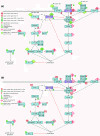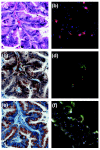Evolution of an adenocarcinoma in response to selection by targeted kinase inhibitors
- PMID: 20696054
- PMCID: PMC2945784
- DOI: 10.1186/gb-2010-11-8-r82
Evolution of an adenocarcinoma in response to selection by targeted kinase inhibitors
Abstract
Background: Adenocarcinomas of the tongue are rare and represent the minority (20 to 25%) of salivary gland tumors affecting the tongue. We investigated the utility of massively parallel sequencing to characterize an adenocarcinoma of the tongue, before and after treatment.
Results: In the pre-treatment tumor we identified 7,629 genes within regions of copy number gain. There were 1,078 genes that exhibited increased expression relative to the blood and unrelated tumors and four genes contained somatic protein-coding mutations. Our analysis suggested the tumor cells were driven by the RET oncogene. Genes whose protein products are targeted by the RET inhibitors sunitinib and sorafenib correlated with being amplified and or highly expressed. Consistent with our observations, administration of sunitinib was associated with stable disease lasting 4 months, after which the lung lesions began to grow. Administration of sorafenib and sulindac provided disease stabilization for an additional 3 months after which the cancer progressed and new lesions appeared. A recurring metastasis possessed 7,288 genes within copy number amplicons, 385 genes exhibiting increased expression relative to other tumors and 9 new somatic protein coding mutations. The observed mutations and amplifications were consistent with therapeutic resistance arising through activation of the MAPK and AKT pathways.
Conclusions: We conclude that complete genomic characterization of a rare tumor has the potential to aid in clinical decision making and identifying therapeutic approaches where no established treatment protocols exist. These results also provide direct in vivo genomic evidence for mutational evolution within a tumor under drug selection and potential mechanisms of drug resistance accrual.
Figures




References
-
- Lal A, Lash AE, Altschul SF, V V, Zhang L, McLendon RE, Marra MA, Prange C, Morin PJ, Polyak K, Papadopoulos N, Vogelstein B, Kinzler KW, Strausberg RL, Riggins GJ. A public database for gene expression in human cancers. Cancer Res. 1999;59:5403–5407. - PubMed
-
- Greenman C, Stephens P, Smith R, Dalgliesh GL, Hunter C, Bignell G, Davies H, Teague J, Butler A, Stevens C, Edkins S, O'Meara S, Vastrik I, Schmidt EE, Avis T, Barthorpe S, Bhamra G, Buck G, Choudhury B, Clements J, Cole J, Dicks E, Forbes S, Gray K, Halliday K, Harrison R, Hills K, Hinton J, Jenkinson A, Jones D. et al.Patterns of somatic mutation in human cancer genomes. Nature. 2007;446:153–158. doi: 10.1038/nature05610. - DOI - PMC - PubMed
-
- Ding L, Getz G, Wheeler DA, Mardis ER, McLellan MD, Cibulskis K, Sougnez C, Greulich H, Muzny DM, Morgan MB, Fulton L, Fulton RS, Zhang Q, Wendl MC, Lawrence MS, Larson DE, Chen K, Dooling DJ, Sabo A, Hawes AC, Shen H, Jhangiani SN, Lewis LR, Hall O, Zhu Y, Mathew T, Ren Y, Yao J, Scherer SE, Clerc K. et al.Somatic mutations affect key pathways in lung adenocarcinoma. Nature. 2008;455:1069–1075. doi: 10.1038/nature07423. - DOI - PMC - PubMed
Publication types
MeSH terms
Substances
LinkOut - more resources
Full Text Sources
Other Literature Sources
Medical

